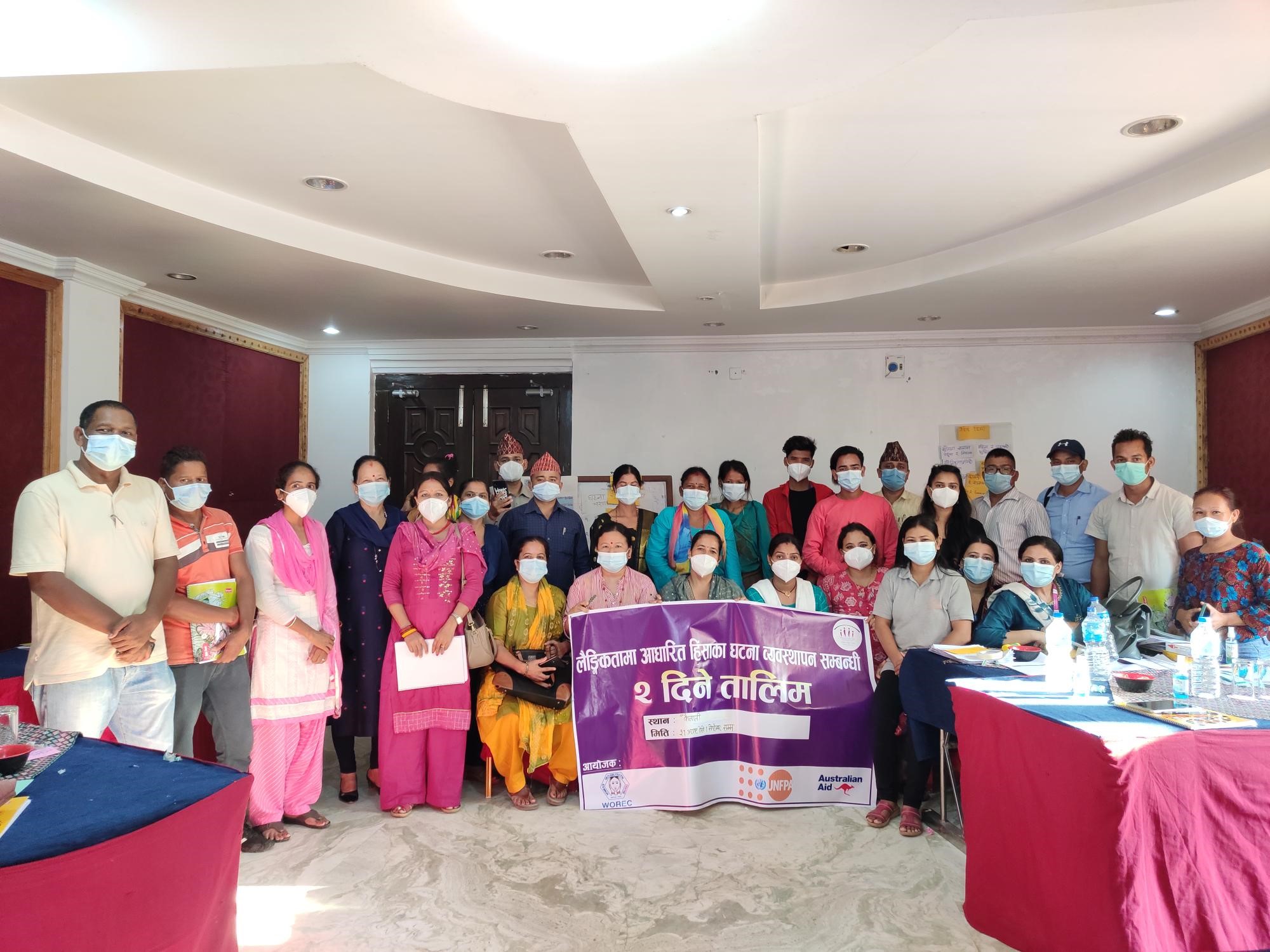
From the month of July to October, Women Rehabilitation Centre (WOREC) conducted the following in-person and virtual training on Basic Humanitarian principles and Safe Referral, Training on Basic Psychosocial Support, Case Management Training, and Orientation on Clinical Management of Rape
.jpg)
All the training was organized in partnership with the United Nations Population Fund (UNFPA) under the humanitarian response program of Gender-Based Violence. The Basic Humanitarian Principle and Safe Referral trainings, as well as the case management trainings, were based on the modules developed by the GBV sub-cluster in close coordination with expert members under the GBV sub-cluster including WOREC whereas, the training on clinical management of rape and basic psychosocial support were prepared by respective facilitators and WOREC team.
.jpg)
The main objective of the training on clinical management of rape training was to discuss emerging issues of rape, sexual violence, and clinical management of rape itself, to underline the major challenges and best practices during the rape case handling targeted to the emergency situation and to share the GBV protocol focusing on the clinical management of rape and on agencies role. The key aim of training based on Basic Humanitarian Principle and Safe Referral was to roll out the training modules to the GBV sub-cluster members, to create an open space for participants to share their experiences while working in GBV, and to identify available GBV support services at respective areas. The objective of the case management training was to discuss various steps of case management as per the module prepared, to emphasize providing a survivor-centric approach during case management, and to create an open space for participants to share their experiences while handling GBV cases. The key objective of the PFA training was to build the capacity of females at the community level to provide psychological first aid especially in times of crisis such as floods and landslides.
.jpg)
As each training was aimed at GBV service providers, the training incorporated a total of 369 participants from respective areas, among which 261 were female, 100 male, and 8 from the LGBTIQ+ community who belonged to various service fields including OCMC, I/NGO, safe house, Judicial Committee, WHRDs, Women and Children Department of various municipalities, CPSW, District Administration Office, advocates and police department.
Apart from the training contents, the sessions equally focused on group discussions which brought out various issues that GBV survivors, as well as GBV service providers, face at the ground level which included that many cases become hostile as survivors change their decision due to external pressure from political parties or perpetrators. Likewise, it was also conveyed that many services aren’t either gender friendly or disabled friendly as most service centers lack basic needs such as toilets and also proper support systems for people with disabilities such as interpreters.
The issue of survivor’s reintegration was also rightly brought out by most participants as they shared that many GBV survivors are neither accepted by their families nor have skills or economic generating options; a participant expressed, “it is definitely necessary to provide survivors with essential services when they come to us or any other GBV service providers but it is also essential that government or any other sector working for GBV focus on building their skills and capacities, provide them with economic opportunities so that they do not have doubt on themselves and are able to live independently.”
.jpg)
Most participants also rightly brought out the issue of survivors’ reintegration as they shared that many GBV survivors are neither accepted by their families nor have skills or economic generating options. According to the participant in the training, “It is definitely necessary to provide survivors with essential services when they come to us or any other GBV service providers, but it is also essential that government or any other sector working for GBV focus on building their skills and capacities, provide them with economic opportunities so that they do not have doubt on themselves and are able to live independently.”
.jpg)
Participants also shared that training on case management must also be provided to all authorities from municipalities as well as the judicial committee as most of them are unaware of the techniques and about survivor-centric approaches.
Similarly, lack of sensitivity about GBV cases was seen missing even among the GBV service providers themselves, and also the justice-seeking process for a survivor is very long due to which there are chances of interventions of many external factors which also incorporates the insensitivity of service providers towards the survivors and the case as a whole as well as the pressure from the side of perpetrators and societal norms.
Lack of coordination between various GBV service providers was also brought into light due to which proper information isn’t flowing regarding GBV cases-there is confusion as to where a survivor should be kept and how the finance will be managed for her. However, the training session was also taken as an opportunity by participants to coordinate and communicate with faces from around their area and working sector, and that the training helped them form new connections that would help them in their work in the coming days.